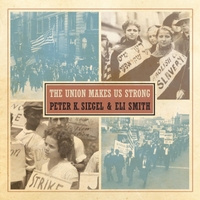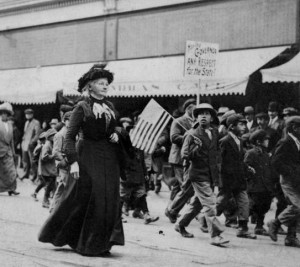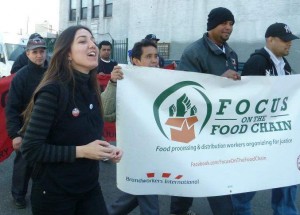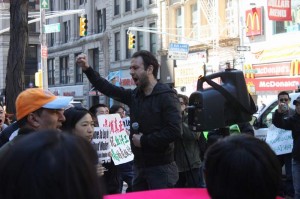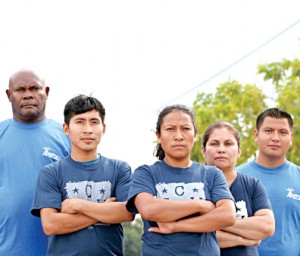Podcast: Play in new window | Download
Updates:
- Michael Ratner: Where Is The Evidence of Chemical Weapons Used In Syria?
- Grant Chelsea Manning Clemency Or A Pardon
—-
There Is Power In A Union: Labor Songs
Songs of the American labor movement called for fair wages, dignity and voiced grievances. Classic labor songs such as “Which Side Are You On” or “There Is Power In A Union” affirmed the value of the worker to society and expressed hope in their lyrics. Woody Gutherie, Pete Seeger and Joe Hill were leaders of the movement, and sang songs with a passion and love for their fellow workers.
Peter Siegel:
- I’ve been singing these songs all my life. My parents sang these songs. I got a guitar when I was about 13 years old. One of the first songs I learned was Talking Union, along with Bird Dog and Don’t Take Your Guns to Town.
- In recent years, when the state started cracking down on unions. The reporting that was coming through the media about these things, didn’t really explain what a union was and why there unions in the first place, and what the issues were.
- I think these songs do a very clear and direct job of explaining that.
- Many of the issues are still the same as they were when these songs were written. Eli and I talked about and got together and decided to make this album.
- Martin Luther King Jr., talk about the hottest places in hell being reserved for those in times of crisis do nothing.
- The Death of Mother Jones: I don’t think Gene Autry had a particular connection to that song, he apparently got the song from OK Records, which was his label.
- Eli plays the steel guitar on our record and sings it beautifully.
- One over-arching aspect of the songs is they give you a feeling of what its like to have a labor movement.
- And also now to give people a feeling of what it was like in the past because I think America is an amnesiac society.
- Most of the songs on our album are from 80 to 100 years ago.
- Which Side Are You On? It’s a song written by Florence Reece, in a traditional style from the heart of Appalachia, in the coal mining region and we rendered in a way that’s as authentic as we can be to that style.
Guest – Peter Siegel is a musician, a record producer and performance artist who has worked with Doc Watson, Hazel Dickens and Roy Buchanan. He’s produced a number of great albums for Nonesuch, Folkways and Rounder Records in the last 50 years.
Guest – Eli Smith is a banjo player, writer and promoter of folk music, living in New York City. Eli is a Smithsonian Folkways recording artist and produces two folk festivals every year.
—-
Brandworkers – Focus On The Food Chain
Nearly 35 thousand workers are employed to run New York City’s massive food processing and distribution. The vast majority are immigrant workers from all over the world, Latin America, the Caribbean, China and Nepal. They depend on this work for their livelihood yet they’re often exploited through wage theft, reckless disregard of health and safety, plus egregious discrimination. We welcome back attorney Daniel Gross, executive director of Brandworkers, a non-profit organization protecting and advancing the rights of retail and food employees. They’ve had numerous victories including recovering unpaid wages and forcing companies such as Flaum Appetizing into full compliance of workplace protections. The efforts to achieve these victories are based on the labor movement of the late 19th century using direct action and everyday solidarity.
- That approach worked for several decades. Labor identified itself with having a seat at the table with government and business and frankly lost its sense of being a fighting movement.
- As many predicted, that arrangement among labor, capital and government wouldn’t hold.
- Capital and government understood that it was a temporary sessation of hostility to worker’s right to organize.
- What we see now is the NLRB system come undone.
- It’s very easy for an employer with the right union-busting attorney to quite effectively undermine the worker’s right to go through the traditional processes we’ve understood for a while to form a union.
- This multi-billion dollar global union busting industry which is led by law firms.
- These folks wake up every day in the morning and seek to undermine working people coming together to do better at work for their families.
- 93 out of 100 workers today are not in a labor union traditionally and have very little prospect getting in.
- Starbucks when I realized the traditional model was ineffective.
- Our members work as bakers, they process seafood, they drive trucks that deliver all kinds of food and beverages to the grocery stores and restaurants, where we all get our food.
- Our motto is empowering workers to build and lead their own campaigns for justice at work and in the food system.
- Most recently, we announced a campaign at the Tom Cat bakery.
- Workers marched and made declaration of dignity, demanding respect from management and an end to an under-payment scheme and hands off the benefits they’ve accrued.
Jose Romero:
- Flaum Appetizing was a kosher factory, we were working very long hours without being paid overtime, there were no benefits including no vacations.
- We decided to unite and came together one day during our break, we all met on the patio and decided we were going to confront the boss altogether.
- This manager would attack us, and yell, call us cockroaches, would hurry us and call us stupid.
Guest – Attorney Daniel Gross, Executive Director of Brandworkers, a non-profit organization protecting and advancing the rights of retail and food employees.
Guest – Juan Romero from Flaum Appetizing who works as a cook on the West side of Manhattan.
—-
Farm Workers: Coalition of Immokalee Workers
This year’s Labor Day, farmworkers with the Coalition of Immokalee Workers travel across Florida calling on Publix Supermarkets to join the Fair Food Program. Who are the Coalition of Immokalee workers? They’re a Florida based community organization of mainly immigrants from Latin America and the Caribbean including Mayan Indian and Haitian immigrants who have been working low wage jobs throughout Florida. The farm workers routinely face a number of different kinds of exploitation, poverty, wage theft, physical and verbal abuse as well as sexual harassment of many women working in the fields. Their campaigns focus on the big corporate buyers of the produce that they pick in an effort to improve wages and working conditions in the fields. They started with Taco Bell and from there launched campaigns with McDonald’s, Burger King, since then 11 other companies are cooperating to improving wages and working conditions in their supply chains. Last year Trader Joe’s and the Coalition of Immokalee Workers signed an agreement that formalized the ways in which the supermarket chain will support the CIW’s Fair Food Program. Their efforts continue to urge Publix and Wendy’s fast food to join up.
Silvia Perez:
- My experience as a woman working in the fields, its been very difficult for me, we often do the same work that men do in the industry.
- We face heat exposure and having to work long hours, under the Florida Sun, and also to over fill our buckets to keep extra tomatoes on top for which we were not paid.
- For many years before the CIW began its Fair Food Program, farm workers were paid an average of 45 cents per 32 lb bucket.
- That’s been the same wage that farm workers received in Florida for more than 30 years.
- There was no guaranteed wage that we would receive in the field, we were paid the bucket rate.
- While there should be a minimum wage and we should get that guarantee to get paid that minimum wage, often times we didn’t receive it.
- With our campaign for Fair Food, which brought on board 11 major corporations we developed the Fair Food Program, an initiative which is a partnership between farmers, farmworkers and the major retailers and because of that program things are changing.
- Our organization is not a union, we are a worker and community based organization that was formed by farm workers themselves.
- In addition to Wendy’s we’ve asked Publix the largest Florida based corporation to come on board as 11 other companies have. Specifically we ask for 2 things, to pay 1 penny more a pound for the tomatoes that they’re buying to go directly to farm workers, and to respect our rights.
Guest – Silvia Perez with the Coalition Immokalee Workers and also CIW campaign organizer Jake Ratner who will translate.
Guest – Jake Ratner, translater and son of co-host Michael Ratner. Jake traveled and studied in Cuba and Bolivia, South America. He now works with the Coalition of the Immokalee Workers.
—————————————————————-
